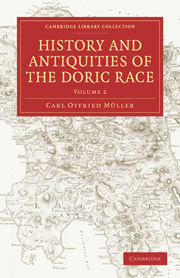Book contents
- Frontmatter
- Contents
- Map
- BOOK III POLITICAL INSTITUTIONS OF THE DORIANS
- CHAP. I
- CHAP. II
- CHAP. III
- CHAP. IV
- CHAP. V
- CHAP. VI
- CHAP. VII
- CHAP. VIII
- CHAP. IX
- CHAP. X
- CHAP. XI
- CHAP. XII
- BOOK IV DOMESTIC INSTITUTIONS, ARTS, AND LITERATURE OF THE DORIANS
- APPENDIX VI
- APPENDIX VII
- APPENDIX VIII
- APPENDIX IX
- Index of subjects
- Index of authors
- ADDITIONS AND CORRECTIONS
CHAP. III
Published online by Cambridge University Press: 05 August 2011
- Frontmatter
- Contents
- Map
- BOOK III POLITICAL INSTITUTIONS OF THE DORIANS
- CHAP. I
- CHAP. II
- CHAP. III
- CHAP. IV
- CHAP. V
- CHAP. VI
- CHAP. VII
- CHAP. VIII
- CHAP. IX
- CHAP. X
- CHAP. XI
- CHAP. XII
- BOOK IV DOMESTIC INSTITUTIONS, ARTS, AND LITERATURE OF THE DORIANS
- APPENDIX VI
- APPENDIX VII
- APPENDIX VIII
- APPENDIX IX
- Index of subjects
- Index of authors
- ADDITIONS AND CORRECTIONS
Summary
On the Helots of Sparta.
1. The condition of the Periœci and that of the Helots must be carefully distinguished from each other; for the latter state we have no other expression than “bondage,” to which that of the Periœci had not the slightest resemblance. The common account of the origin of this class is, that the inhabitants of the maritime town Helos were reduced by Sparta to this state of degradation, after an insurrection against the Dorians already established in power. This explanation however rests merely on an etymology, and that by no means probable, since such a Gentile name as Εἵλως (which seems to be the more ancient form) cannot by any method of formation have been derived from Ελος. The word Εἵλως is probably a derivative from ῝Ελω in a passive sense, and consequently means the prisoners. Perhaps it signifies those who were taken after having resisted to the uttermost, whereas the Periœci had surrendered under conditions; at least Theopompus calls them Achæans as well as the others. It appears to me however more probable that they were an aboriginal race, which was subdued at a very early period, and which immediately passed over as slaves to the Doric conquerors.
In speaking of the condition of the Helots, we will consider their political rights and their personal treatment under separate heads, though in fact the two subjects are very nearly connected.
- Type
- Chapter
- Information
- History and Antiquities of the Doric Race , pp. 30 - 50Publisher: Cambridge University PressPrint publication year: 2010First published in: 1830



